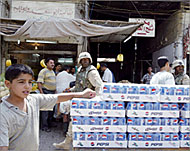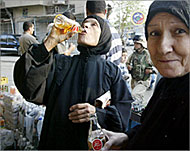Cola battle erupts in Iraq
Foreign-made cola brands are pouring into the Iraqi market, sparking a cut-throat soft drinks war against the dominant Iraqi Pepsi Cola.
 |
|
An influx of foreign sodas in Iraq |
Pepsi Cola had been the only cola in Iraq since the mid-1960s when the Arab League placed Coca-Cola on a blacklist to protest the US giant’s decision to build a factory in Israel, forcing the company to close its Iraqi plant.
But the Iraqi cola, which comes in a bottle priced at just 16 US cents, is now being pushed aside at street stalls and supermarkets by customers, grabbing foreign brands – mainly from Iran, Jordan, Saudi Arabia, Syria and Turkey.
“During the Saddam years, we had no choice but Iraqi Pepsi,” said Sawsan Rasul, a 38-year-old housewife at a supermarket in Baghdad.
“Now I can buy foreign cola. My favourite is Saudi Pepsi,” she added.
Iraqi Pepsi is currently selling about 7.2 million bottles a month, down more than 60 percent from its pre-war sales figures. The company attributes the fall to power shortages rather than falling consumer demand.
Import influx
An influx of imports came after the United Nations Security Council last month put an end to 13-year-old economic sanctions imposed on Iraq.
The US-led coalition also introduced a “tariff holiday” on almost all goods until the end of the year to boost the country’s economy.
 |
|
Iraqis say Saudi Pepsi is their |
The Iraqi branch of Soft Drink Co, which produces Pepsi Cola, Mirinda and Seven Up, was established during the 1950s. It used to renew its US license every year and import concentrate from the United States.
After the 1991 Gulf War, when a US-led coalition ousted Iraqi troops from neighbouring Kuwait, it lost its license and the right to import concentrate.
During the blanket embargo the factory imported concentrate from Europe, but had to stop its production line for canned Pepsi when machinery broke down and it was unable to import German-made spare parts.
During the sanctions Iraqi’s Pepsi “tasted very light and not as good. It was just sweet coloured-water with no fizz,” said Baghdad resident Adel Mohammad.
Some shop owners said they would stop selling Iraq Pepsi until the formation of a new government, expected within the next two years.
“The government (of Saddam Hussein) had a quality control department at the Health Ministry to check raw materials and ingredients of our products. But since we have no government now, I don’t trust Iraqi products, which could harm our customers,” said Amar Denkha, a supermarket manager.
Soft Drink Co Managing Director, Hamid Jassim, said the company was in talks with the US parent company to renew its licence within a few months.